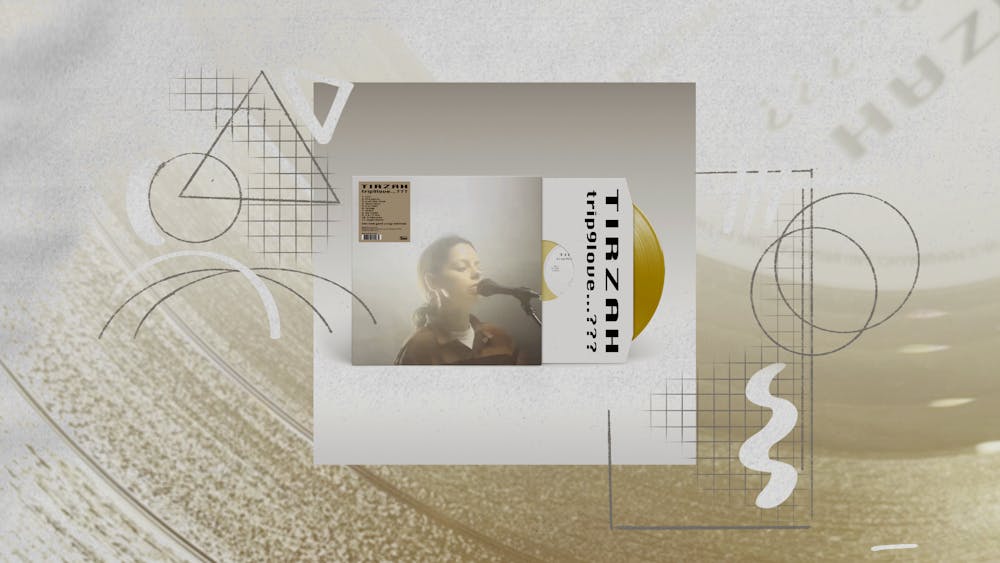Tirzah’s trip9love…???, released this past September, is an album shrouded in mystery. The London–based electronic artist gave no press interviews in the lead–up to its release, and dropped the album onto streaming platforms on a Tuesday night with hardly any promotion.
Her previous project, Colourgrade, got the opposite press treatment, lots of interviews, photoshoots, music videos—the whole shebang. Searching for trip9love…??? on Google yields somewhat of a digital void—there are a few scattered review articles, but not much else. Alternatively, a search for Colourgrade produces nearly a dozen different articles profiling Tirzah—from The New Yorker, to Rolling Stone, to Vogue—and all of them seem to be focused on a common theme: Tirzah’s new motherhood.
When sitting down to write an article, a journalist will ask themselves: “what’s my angle?” The “angle” is their starting point: the framework the writer allows themselves to work within When writing an article for publication, for which the work has to stay within a certain word count and develop a coherent story, it’s almost an essential rule for the author to adopt an overarching theme for their piece. The problem with this approach, especially when the writer is critiquing a work of art, is that if a work of art becomes defined by one story, it becomes reduced to that one thing.
Just like magazine articles, indie albums are also expected to have both a story to tell and a story to be told about them. Think of Sufjan Stevens’ remarkable indie folk album Javelin, which was a shoo–in for best album lists last year. The album’s critical reception, and the public perception of its “meaning,” is inextricable from the tragic story surrounding its recording. Stevens dedicated the album to his late partner Evans Richardson, who passed away last April. That same year, Stevens was diagnosed with a rare autoimmune disorder that took away his ability to walk. When listening to Javelin, the meaning of each lyric is grounded in this context. The surrounding mythos of Javelin gives the album its “meaning,” but also puts it inside a rigid box.
Although Tirzah could have chosen to take a step back from the public eye for any number of unrelated reasons, I suspect that she didn’t like the treatment of Colourgrade as an album ‘about motherhood,’ just because new motherhood was something that was happening in her life. With its lack of any context or story, trip9love…??? is free to explore an infinite number of stories. The result is an album that warps and bends according to the listener’s own experience of it.
This isn’t to say that trip9love…??? is not a personal album. It’s stunningly intimate and obviously very personal to Tirzah. It’s just that, unlike Javelin, these personal details aren’t accessible to the listener, one of the album’s greatest strengths. Although Tirzah doesn’t let us in on the details of her life, she does everything in her power to make the experience of her music feel deeply personal. Her soft vocals are unguarded, improvisational, and laced with slight imperfections in the best way—like a kind of whispered free–jazz solo, or someone singing in their bedroom, letting their emotions out without the presence of an audience. Tirzah’s vocal recording is intentionally amateurish—tracks often feature white noise and little sounds like clothes ruffling or mouse clicks in the background, all of which add to that alone–in–the–bedroom feeling.
These amateurish vocals are matched by equally juvenile–sounding trap beats courtesy of Mica Levi, the Oscar–nominated film composer behind the scores for Pablo Larraín’s Jackie and Jonathan Glazer’s haunting Holocaust film The Zone of Interest. Although the album is attributed to Tirzah, the music can be considered more of a collaboration than a solo project, with Levi producing all of Tirzah's music. The duo met as teenagers at the Purcell School for Young Musicians and became best friends and collaborators, with Tirzah improvising on top of the glitchy beats that Levi made. Although the two are classically–trained musicians in their thirties, their music maintains the youthful rawness of two friends making music for fun—it’s just that the emotions being communicated have grown deeper, more complex and characteristically ‘adult.’
Levi’s trap beats sound like something a kid downloading FL Studio for the first time would make before they learned how to make a ‘proper’ trap. Besides its odd rhythm and slow pace, it features sleigh bell percussion hits that sound straight out of the default sound library. Not only does the beat sound like it was made by a teenager messing around with their laptop, it’s also the only beat on the entire album—it’s almost like said teenager couldn’t figure out how to make another beat, so they just said "fuck it" and hit copy/paste. It shows up in eight of the eleven tracks, with slightly altered distortion and mixing on each iteration. The other three songs are entirely beatless. Although on first listen the repetition can become grating, upon further listens, the beat becomes almost addictive. 50 listens in, the beat is oddly comforting, like coming back to a familiar bed after a long day. In the chaotic and constantly changing world of the 21st century, it feels good to have something constant.
Tirzah’s impressionistic lyrics, which seem to float around the idea of a crumbling relationship, frame the harsh and skittering beat as a kind of attack or argument, a pushback against an unfaithful lover. The beat’s aggressiveness is undercut by a bed of melancholy, gothic–sounding piano loops, suggesting an underlying vulnerability and pain in Tirzah’s attempted attacks. The opening track, “F22,” conveys the feeling of wanting to stay in one perfect moment indefinitely, fearing what the future might bring. Tirzah pleads to her lover: “In my world, in my world / I can't see, I can't see / In your world, I'm your world / I want to see, I want to see.” Without her love, Tirzah’s world is muddled and confusing, but in his presence, everything suddenly comes together in a moment of clarity and togetherness. She asks her love to enjoy the moment with her: “Smile 'cause you're here with me,” betraying the first signs of a schism between the two—you shouldn’t have to ask someone to smile. There’s an unspoken tension there, which is suggested more explicitly in the last verse: “Your eyes is something you can't hide.”
This line marks a turn towards distrust and paranoia; the perfect moment has passed. In the next song, “Promises,” which quickly picks up with the same crispy beat, Tirzah muses on “promises, promises, deals, deals.” A theme of retreat runs through the song, with lines like: “Came back / To a place where I felt good.” Tirzah’s lyrical repetition compounds on the incessant piano loops and trap beat. The feeling is claustrophobic, like a maze with no possibility of escape: “And my head is spinnin' round / I'm lyin' by myself.” Distressed, she goes somewhere she feels safe, but her shelter isn’t what it seems.
The situation comes to a head on “u all the time.” The relationship is too overbearing: “Your weight on mine / You all the time.” Her paranoia is increasing, and close proximity is revealing new lies and mistakes as Tirzah is “keepin’ receipts.” The following song, “their Love,” feels like a moment of quiet acceptance after all the stress and desperate pleas for reconciliation, and it’s absolutely gorgeous. For the first time so far, the trap beat fully drops away, signaling a momentary surrender. A breakup might be inevitable. “Their love, only a dream, you know / They love, they lose / Daylight, filled with pure fire.” Love might be only a dream, swallowed by the night, but right now Tirzah is remembering the daylight—that pure fire which made everything make sense, even if only for a day: “Some bridges burn, didn't you know?” What follows is heartbreaking: “Fade, yeah / Yeah, lone–lone / Lone–lone–lone–lone–lone–lone–lone–lonely.” The syllables start out slow and stretched, then speed up as they approach the end, like a stone accelerating down into a dark well, skittering off the walls. Each repetition sinks the word deeper into isolation. It’s over, and she’s all alone.
At this point we’re getting into real depressing territory, but thankfully, there’s a light at the end of this tunnel. Track 9, “2 D I C U V,” explodes with rapturous electric guitars to Tirzah’s repeated pronouncements of “I just feel so good.” The two lovers come back together again: “Two sides, think alike / Two lives, link tonight.” On the closer, “nightmare,” another guitar–backed track, Tirzah lays out a path towards future reconciliation. It won’t be easy, but there’s a way: “Show more of your love, your hold.”
Although the lyrics are abstract, their suggestions of some real event—relationship struggles? a breakup?—are so unmistakable that one feels they can almost reach out and touch it, only to come up empty each time.
With each listen, I feel the crushing weight of trip9love…???’s story all around me, like heavy rain falling down in a thunderstorm—but when I try to hold it in my hands and observe some song closely, it slips away like water through my fingertips. I end up having to apply my own experiences to each song, which was likely Tirzah’s intention all along. Although some might be frustrated and confused by trip9love…???’s non–story, its profound ambiguity seems to reward an infinite number of listens. Sure, maybe I could find some more context behind trip9love…??? if I just dug a little deeper. But truthfully, whatever’s out there, I don’t want to know.







